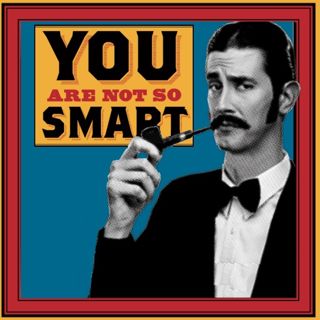
138 - Evil
In this episode, we sit down with psychologist Julia Shaw, an expert in memory and criminal psychology, to discuss her new book - Evil. In the book, she makes a case for something she calls "evil empathy," seeing people who do heinous things as fellow human beings instead of as monsters. According to Shaw, othering criminals by categorizing them as a separate kind of human allows us to put them out of our minds and disappear them to institutions or prisons. The result is we become less-able to prevent the sort of behavior the harms others from happening again and again. In fact, she says "there's no such thing as evil," and sees the term as an antiquated, magical label that dehumanizes others, preventing us from accumulating the sort of scientific evidence that could lead to a better society.- Show notes at: www.youarenotsosmart.com- Become a patron at: www.patreon.com/youarenotsosmartSponsors:-- • The Great Courses: www.thegreatcoursesplus.com/smart -- • Squarespace: www.squarespace.com CODE: SOSMART-- • One Fix: www.getonefix.com CODE: YANSS||| Show Notes at YouAreNotSoSmart.com |||Patreon: http://patreon.com/youarenotsosmart
8 Loka 201853min

137 - Narrative Persuasion (rebroadcast)
One of the most effective ways to change people’s minds is to put your argument into a narrative format, a story, but not just any story. The most persuasive narratives are those that transport us. Once departed from normal reality into the imagined world of the story we become highly susceptible to belief and attitude change.In this episode, you’ll learn from psychologist Melanie C. Greene the four secrets to creating the most persuasive narratives possible.- Show notes at: www.youarenotsosmart.com- Become a patron at: www.patreon.com/youarenotsosmartSponsors:-- • The Great Courses: www.thegreatcoursesplus.com/smart -- • Squarespace: www.squarespace.com CODE: SOSMART-- • One Fix: www.getonefix.com CODE: YANSS||| Show Notes at YouAreNotSoSmart.com |||Patreon: http://patreon.com/youarenotsosmart
24 Syys 201838min

136 - Prevalence Induced Concept Change
In this episode we explore prevalence induced concept change. In a nutshell, when we set out to change the world by reducing examples of something we have deemed problematic, and we succeed, a host of psychological phenomena can mask our progress and make those problems seem intractable -- as if we are only treading water when, in fact, we’ve created the change we set out to make.Sponsors:-- • The Great Courses: www.thegreatcoursesplus.com/smart -- • Squarespace: www.squarespace.com CODE: SOSMART-- • ZipRecruiter: www.ziprecruiter.com/notsosmart||| Show Notes at YouAreNotSoSmart.com |||Patreon: http://patreon.com/youarenotsosmart
10 Syys 201832min

135 - Optimism Bias (rebroadcast)
In this episode, Tali Sharot, a cognitive neuroscientist and psychologist at University College London, explains our' innate optimism bias.When the brain estimates the outcome of future events, it tends to reduce the probability of negative outcomes for itself, but not so much for other people. In other words, if you are a smoker, everyone else is going to get cancer. The odds of success for a new restaurant change depending on who starts that venture, you or someone else. Sharot explains why and details how we can use our knowledge of this mental quirk to our advantage both personally and institutionally.More about Tali Sharot and her book The Optimism Bias here: theoptimismbias.blogspot.com/Sponsors:-- • The Great Courses: www.thegreatcoursesplus.com/smart ---- • Squarespace: www.squarespace.com CODE: SOSMART-- • ZipRecruiter: www.ziprecruiter.com/notsosmart||| Show Notes at YouAreNotSoSmart.com |||Patreon: http://patreon.com/youarenotsosmart
26 Elo 201839min

134 - The Elaboration Likelihood Model
In this episode we sit down with psychology legend Richard Petty to discuss the Elaboration Likelihood Model, a theory he developed with psychologist John Cacioppo in the 1980s that unified the study of attitude change and persuasion and has since become one of the most robust models for explaining how and why some messages change people’s minds, some don’t, and what makes some stick and others fade in influence over time.- Show notes at: www.youarenotsosmart.com- Become a patron at: www.patreon.com/youarenotsosmartPatreon: http://patreon.com/youarenotsosmart
16 Elo 201853min

133 - Uncivil Agreement
In this episode, we welcome Lilliana Mason on the program to discuss her new book, Uncivil Agreement, which focuses on the idea: “Our conflicts are over who we think we are, rather than reasoned differences of opinion.”Personally, I feel like this is just about the most important thing the social sciences are studying right now, and I think Mason is one of the its most brilliant scientists - I promise, the insights you are about to hear will change the way you think about politics, tweeting, elections, and arguing with people on the other side of just about everything.Patreon: http://patreon.com/youarenotsosmart
30 Heinä 20181h 17min

132 - Practice (rebroadcast)
Is it true that all it takes to be an expert is 10,000 hours of practice? What about professional athletes? Do different people get more out of practice than others, and if so, is it nature or nurture? In this episode we ask all these things of David Epstein, author of The Sports Gene, who explains how practice affects the brain and whether or not greatness comes naturally or after lots and lots of effort.-- Show Notes at: youarenotsosmart.com ---- This episode's notes: goo.gl/hDjTVJ ---- Become a patron at: www.patreon.com/youarenotsosmart --SPONSORS• The Great Courses Plus: www.thegreatcoursesplus.com/smart• Squarespace: www.squarespace.com Offer code: SOSMART• ZipRecruiter: www.ziprecruiter.com/notsomartPatreon: http://patreon.com/youarenotsosmart
16 Heinä 201843min

131 - The Marshmallow Replication
The marshmallow test is one of the most well-known studies in all of psychology, but a new replication suggests we've been learning the wrong lesson from its findings for decades.-- Show Notes at: http://youarenotsosmart.com ---- This episode's notes: https://goo.gl/hDjTVJ ---- Become a patron at: www.patreon.com/youarenotsosmart -- SPONSORS• The Great Courses Plus: https://www.thegreatcoursesplus.com/smart• Squarespace: https://www.squarespace.com Offer code: SOSMART• Lightstream: http://lightstream.com/notsosmartPatreon: http://patreon.com/youarenotsosmart
2 Heinä 201850min






















